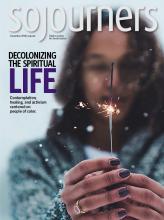ON THE DAY Brett Kavanaugh was confirmed by the Senate to a lifetime seat on the Supreme Court, I tweeted this: “Today was a day of protest, rage, mourning, lament. Tomorrow we go on by going deeper, and learn that hope is not a feeling, but a decision—based on whatever we call faith. Stay strong and take care of each other.”
The nation is in trauma, with many women and people of color in particular being retraumatized almost every day. But Advent is upon us, and the message of that liturgical season never changes. Advent is a season of waiting for the coming of Christ. Christ will come again, and not just ultimately but time and time again, in all kinds of unexpected ways.
So, in Advent, we wait—expectantly—for Jesus Christ to come again in our personal and our public lives. That is our hope, based not on optimism but on faith.
The situation we face in Donald Trump’s autocratic impulses and actions is indeed a constitutional crisis, the severity of which will depend, in part, on whether our institutions and structures, in the wake of the midterm elections, will hold the executive accountable, or not.
This is also a moral crisis regarding whether our “better angels,” as Abraham Lincoln put it, or our worst demons, as Donald Trump seems to evoke every day, will finally triumph. As they say, the jury is still out on that. Trump has opened a Pandora’s box of white racial and male resentment, fear, and hatred, and those forces are not going back into the box, despite election results. The battle between our better angels and our worst demons will be the spiritual battle of our political life for the unforeseeable future.
Read the Full Article

